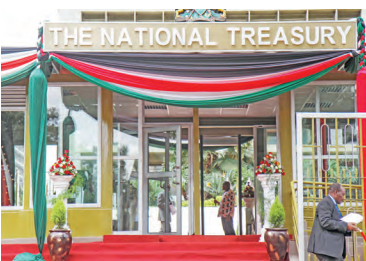
Kenya will largely rely on bond switches, debt swaps, buybacks and refinancing to manage its high debt obligation in the current financial year, the National Treasury has said.
In an elaborate annual borrowing plan for 2024/25 released by the exchequer on Tuesday, the country is staring at a gross refinancing cost of Sh1.669 trillion, comprising a fiscal deficit of Sh768.6 billion, and Sh900.6 billion to refinance maturing debt securities and loans.
“To manage this, we are forced to employ several strategies to meet domestic borrowing target, minimize debt maturity risk, reduce the cost of debt by developing and maintaining a well-priced normal yield curve, contribute to stable liquidity flows and support market development,’’ the report reads.
According to the National Treasury, the Government is actively engaged in liability management operations to reduce the cost of public debt and manage associated risks.
“These operations are crucial for maintaining financial stability, enhancing cost efficiency, and supporting long-term financial goals.”
For domestic debt, President William Ruto’s regime will manage and optimize its obligations through mechanisms such as debt refinancing and bond switches akin to those witnessed in 2020 and 2022.
For FY 2024/2025, there will be substantial bond maturities, including Sh100.1 billion on April 7, 2025, and Sh104.5 billion on May 5, 2025.
High T-bond maturities will also amount to Sh358.7 billion, compared to Sh178.5 billion in FY 2023/24.
A bond switch is a mechanism through which the government replaces existing shorter-duration sovereign bonds with long-duration papers.
Depending upon its debt obligations, the government determines both the source and destination bonds.
Switch auctions usually roll over impending maturities into longer-dated instruments, thereby easing the debt-servicing burden.
While switch auction bonds are yet to become a mainstay in Kenya's debt management, the government has somewhat tested the market by issuing a switch auction in each of the last two years.
In November 2022 for instance, the CBK issued a Sh87.8 billion-switch auction while locking initial bidders to holders of Treasury bills and bonds of the same maturities, which were due on January 9.
The switch auction was successful at extending Sh47.8 billion in expected maturities with holders of a two-year bond accepting the bulk of the switch or Sh39 billion.
The National Treasury had previously deployed the debt management instrument in June 2020.
National Treasury CS John Mbadi said the process includes selecting the best mix of instruments to replace maturing bonds, creating attractive new products for investors, engaging closely with stakeholders, incorporating appealing features into new bonds, and maintaining clear and consistent communication with the market to build confidence and credibility.
“For external debt, the Government will be managing and optimising obligations through debt swaps, debt buybacks, debt refinancing, and other strategies,’’ Mbadi said.
In 2006, Kenya and Italy successfully implemented the Kenya-Italy debt for development programme swap, converting €44 million of debt into funding for development projects.
Last year, Germany also participated in a debt swap program, converting €60 million for similar development purposes. The country also completed a successful Eurobond issuance and buyback transaction.
The country accessed international financial markets to refinance $1.5 billion, or 75 per cent of the 2024 Eurobond. This move eliminated refinancing uncertainties, strengthened foreign exchange market, and stabilized the Shilling.
The country’s public debt continues to rise, with the latest data from the exchequer indicating that it hit
Sh10.56 trillion equivalent to 65.5 per cent of GDP in June.












